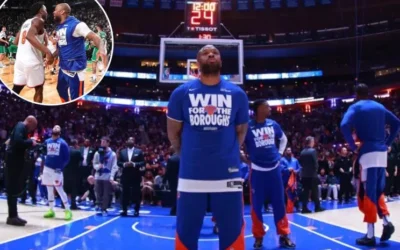Introduction
The recent release of Edan Alexander, an American who was held hostage by Hamas in Gaza, marks a significant moment amid the ongoing turmoil within the Israeli-Palestinian conflict. This event, coupled with Steve Witkoff’s emotional gesture of gifting his late son’s Star of David necklace to Alexander upon his return, encapsulates both the human toll of such conflicts and the resilience of hope and solidarity. Additionally, the political ramifications of these developments extend into the United States, with figures like former President Donald Trump expressing support for the Israeli populace and criticizing Israeli Prime Minister Benjamin Netanyahu.
A Turning Point: The Release of Edan Alexander
Edan Alexander’s release came as part of a negotiated deal with the U.S. government, showcasing the complex interplay between diplomacy and humanitarian concerns. Held captive for several months, Alexander’s situation drew attention not only due to his American nationality but also because of the circumstances surrounding his kidnapping amid the violence that has recently escalated in Gaza.
Reports confirm that negotiations led by U.S. officials sought to secure the safe release of multiple hostages, including Alexander. His eventual freedom was celebrated by family members and advocates who had pushed for his release. The nuances of these negotiations reflect the challenging realities faced by families of hostages caught in geopolitical conflicts.
Steve Witkoff’s Meaningful Gesture
In a deeply moving moment, Steve Witkoff, a prominent American businessman, met with Alexander after his release and gifted him a Star of David necklace that belonged to his late son. This gesture resonates powerfully within the context of personal loss and the shared experiences of those affected by violence and terror.
Witkoff’s son, who tragically passed away, is remembered through this act of kindness. It symbolizes the enduring spirit of love, unity, and remembrance amidst tragedy. By passing down the necklace, Witkoff honors his son’s legacy while simultaneously offering Alexander a token that connects them both as individuals impacted by the same conflict. This story transcends the political scenario; it showcases humanity in its purest form.
The Impact of Hostage Situations on Families
The plight of hostages like Edan Alexander is often overshadowed by the political narratives of war and conflict. Families endure immense stress, anxiety, and heartache during negotiations, with the emotional toll lasting long after the physical return of their loved ones. There are myriad stories of families who have been torn apart by arbitrary violence, each case representing a microcosm within the larger picture of global conflict.
The narratives of hostages serve as a stark reminder of the human cost of war. For the families left behind, the uncertainty is excruciating, as they wait for news about their loved ones’ welfare. The emotional weight carried by hostages and their families is profound and often remains unexplored in media conversations focused on the geopolitical aspects of these crises.
Trump’s Political Stance Amidst Tensions
The release of Edan Alexander comes at a time when tensions related to the Israeli-Palestinian conflict continue to escalate. In this charged atmosphere, former President Donald Trump has publicly expressed his unwavering support for the Israeli people, aligning himself with sentiments that echo a significant segment of American political thought. His criticisms directed at Israeli Prime Minister Benjamin Netanyahu indicate a complicated relationship where allegiance to Israel is often juxtaposed with confrontational politics.
Trump’s comments signal a shift in the traditional approach to U.S.-Israeli relations, intertwining both support for Israel and a growing recognition of domestic political undercurrents that criticize Netanyahu’s leadership. The political landscape is complex, with varying opinions within the U.S. reflecting broader ideological divides regarding foreign policy, human rights, and how to best foster peace in the region.
The Broader Implications for U.S. Foreign Policy
The hostage situation in Gaza and the West Bank, particularly cases like that of Edan Alexander, exemplify broader questions regarding the U.S.’s role in the Middle East. As American officials negotiate terms for hostages’ release, they also navigate the intricacies of diplomatic relations, military assistance, and humanitarian strategies in the region.
Public sentiment in the U.S. regarding the Israeli-Palestinian conflict has been evolving, with more voices advocating for a balanced approach that recognizes the rights and concerns of all parties involved. The complexities underlying U.S. foreign policy are marked by the dual pressures of supporting Israel while also recognizing Palestinian aspirations for statehood and peace.
Humanitarian Concerns Amid Political Turmoil
As discussions about the Israeli-Palestinian conflict unfold, it is crucial to address underlying humanitarian concerns. The plight of families affected by violence — whether they are Israeli or Palestinian — underscores the necessity for a peace process designed to ensure safety, dignity, and prosperity for everyone involved.
Organizations advocating for peace often highlight the need for united efforts focused on humanitarian relief, rebuilding communities, and creating pathways toward diplomatic reconciliation. The emotional toll and long-standing distrust must be addressed through educational initiatives, community dialogue, and grassroots efforts led by individuals who strive for a more harmonious coexistence.
Conclusion: Bridging Divides Through Understanding
The story of Edan Alexander, coupled with Steve Witkoff’s extraordinary act of kindness, suggests a path forward driven by empathy and understanding. Amidst the often stark political realities, stories of personal connection remind us of our shared humanity and the potential for healing and reconciliation.
As the world watches the multifaceted dynamics of the Israeli-Palestinian conflict unfold, it is imperative for leaders and citizens alike to prioritize diplomacy, promote humanitarian aid, and embrace gestures of kindness that foster communal understanding. In recognizing our capacity for compassion, there lies the power to transcend division, even in the most challenging of times.






